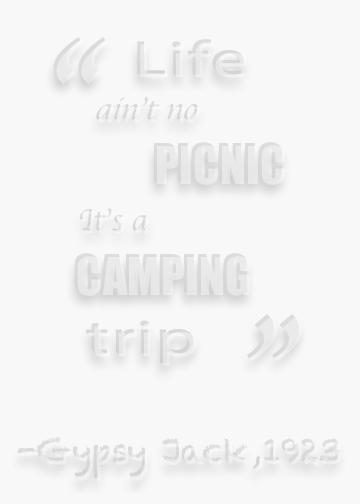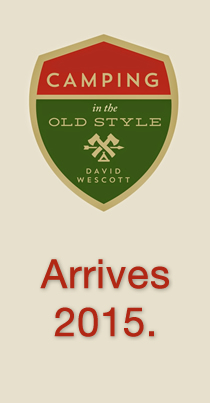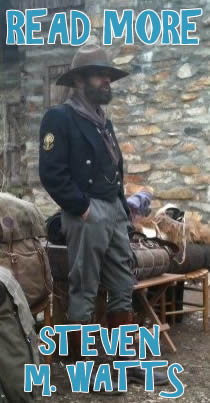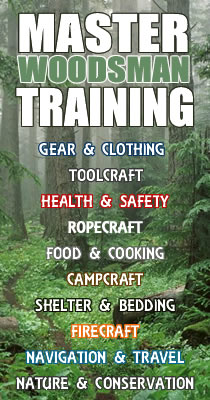If you follow our Twitter account, @MasterWoodsmen, in addition to announcements and general news, we send out a quote every now and again…
———————————————————
“Without natural resources life itself is impossible. From birth to death, natural resources, transformed for human use, feed, cloth ,shelter, and transport us. Upon them we depend for every material necessity, comfort, convenience, and protection in our lives. Without abundant natural resources prosperity is out of reach.” – GIFFORD PINCHOT, Chief Forester, 1898-1910
“We are always getting ready to live, but never living.” – RALPH WALDO EMERSON, US essayist, 1803—82
“Beware of all enterprises that require new clothes.” — HENRY DAVID THOREAU, Walden, 1854
“Life ain’t no picnic…it’s a camping trip.” – GYPSY JACK, 1923
“The man who goes afoot, prepared to camp anywhere and in any weather, is the most independent fellow on earth.” – HORACE KEPHART, Camping and Woodcraft, 1917
“Conservation is a state of harmony between men and land.” — ALDO LEOPOLD, US conservationist, 1887-1948
“As you sit on the hillside, or lie prone under the trees of the forest, or sprawl wet-legged by a mountain stream, the great door, that does not look like a door, opens.” – STEPHEN GRAHAM, The Gentle Art of Tramping, 1926
“I learned early that the richness of life is found in adventure. Adventure calls on all the faculties of mind and spirit. It develops self-reliance and independence. Life then teems with excitement. But man is not ready for adventure unless he is rid of fear. For fear confines him and limits his scope. He stays tethered by strings of doubt and indecision and has only a small and narrow world to explore.” – WILLIAM O. DOUGLAS, Of Men and Mountains, 1950
“Nature and I are two.” — WOODY ALLEN, US film actor, director, & writer, 1935-
“camping n. Formerly, a pastime involving tents, open fires, blanket rolls, and other appurtenances of the outdoor life. Presently, a pastime involving a motorized vehicle providing all the comforts of home but small enough so that nothing is quite as comfortable as it would be at home.” – The Curmudgeons’ Dictionary, Simon Gruff, 1983
“Mother of Marvels, mysterious and tender Nature, why do we not live more in thee.” – HENRI FRÉDÉRIC AMIEL, Swiss writer, 1821-81
“The man with the knapsack is never lost. No matter whither he may stray, his food and shelter are right with him, and home is wherever he may choose to stop.” – HORACE KEPHART, Camping and Woodcraft, 1917
“I made these Sierra trips, carrying only a sackful of bread with a little tea and sugar, and was thus independent and free…” – JOHN MUIR, US naturalist, 1838—1914
Prayer of the Woods
“I am the heat of your hearth on the cold winter nights, the friendly shade screening you from the summer sun, and my fruits are refreshing draughts quenching your thirst as you journey on. I am the beam that holds your house, the board of your table, the bed on which you lie, and the timber that builds your boat. I am the handle of your hoe, the door of your homestead, the wood of your cradle, the shell of your coffin. I am the bread of kindness and the flower of beauty. Ye who pass by, listen to my prayer: harm me not.”
– First used in the PORTUGUESE FOREST RESERVES more than 1,000 years ago. Now used on nature trails throughout the world.
“Do unto those downstream as you would have those upstream do unto you.” ― Wendell Berry
“Solitude is as needful to the imagination as society is wholesome for the character.” – JAMES RUSSELL LOWELL, US poet, essayist, and diplomat, 1819-91
“He who walks alone, waits for no-one.” – HENRY DAVID THOREAU, US writer and naturalist, 1817—62
“Nobody climbs mountains for scientific reasons. Science is used to raise money for the expeditions, but you really climb for the hell of it.” – EDMUND HILLARY, first to summit Everest (1953), 1919— 2008
“As a general rule, adopt the style of clothing which is most generally worn in the particular locality where you intend going.” – E. Kreps
“One of the hallmarks of the veteran woodsman is the way he contrives to make himself comfortable in camp”. –Warren H. Miller, 1915
“Knicks and dull edges are abominations, so use knives and hatchets for nothing but they were made for.” – Horace Kephart, 1917
“It is one of the blessings of wilderness life that it shows us how few things we need in order to be perfectly happy.” – HORACE KEPHART, Camping and Woodcraft, 1917
“There are no unsacred places; there are only sacred places and desecrated places.” ― Wendell Berry
“Conservation viewed in its entirety, is the slow and laborious unfolding of a new relationship between people and land.” — ALDO LEOPOLD, US conservationist, 1887-1948
“I cannot live without books.” – Thomas Jefferson
“A fellow who cannot throw a flapjack is sadly lacking in the skill one expects to find in a real woodcrafter.” – Daniel Carter Beard
“Good company in a journey makes the way seem the shorter.” – IZAAK WALTON, English biographer, 1593-1683
“The influence of fine scenery, the presence of mountains, appeases our irritations and elevates our friendships.” – RALPH WALDO EMERSON, Culture, The Conduct of Life, 1860
“To equip a pedestrian with shelter, bedding, utensils, food, and other necessities, in a pack so light and small that he can carry it without overstrain, is really a fine art.” – HORACE KEPHART, Camping and Woodcraft, 1917
“To laugh often and much; to win the respect of intelligent people and the affection of children; to earn the appreciation of honest critics and endure the betrayal of false friends; to appreciate beauty, to find the best in others; to leave the world a little better; whether by a healthy child, a garden patch or a redeemed social condition; to know even one life has breathed easier because you have lived. This is the meaning of success.” – RALPH WALDO EMERSON, US essayist, 1803—82
“He who needs only coarse food, water and drink, and as pillow his folded arms will find happiness without further search.” – CONFUCIUS, Chinese philosopher, 551—479 BC
“Like winds and sunsets, wild things were taken for granted until progress began to do away with them. Now we face the question whether a still higher ‘standard of living’ is worth its cost in things natural, wild, and free. For us of the minority, the opportunity to see geese is more important than television, and the chance to find a pasque-flower is a right as inalienable as free speech.” —ALDO LEOPOLD, US conservationist, 1887-1948
“I follow nature as the surest guide, and resign myself with implicit obedience to her sacred ordinances.” – CICERO, Roman orator, 106—43 BC
“Camp Life is the climax of all Woodcraft, and the man who leads us there, is a heal-worker for our race.” –Ernest Thompson Seton, naturalist, author, pioneer of the Boy Scouts of America, 1860-1946
“Woodcraft is the first of all the sciences. Woodcraft has made man out of brutish material, and Woodcraft may save him from decay.” –Ernest Thompson Seton, naturalist, author, pioneer of the Boy Scouts of America, 1860-1946
“You can best serve civilization by being against what usually passes for it.”
― Wendell Berry
“Don’t own so much clutter that you will be relieved to see your house catch fire.”
― Wendell Berry, Farming: a hand book
“Ultimately there is only one wilderness, and we are a part of it.” THOMAS J. ELPEL, Participating in Nature
“When going back makes sense, you are going ahead.”
― Wendell Berry
“What could be more superstitious than the idea that money brings forth food?”
― Wendell Berry
“The soil is the great connector of lives, the source and destination of all. It is the healer and restorer and resurrector, by which disease passes into health, age into youth, death into life. Without proper care for it we can have no community, because without proper care for it we can have no life.”
― Wendell Berry, The Unsettling of America: Culture and Agriculture
“The soil under the grass is dreaming of a young forest, and under the pavement the soil is dreaming of grass.”
― Wendell Berry, Given
“It is impossible to overestimate the value of wild mountains and mountain temples as places for people to grow in, recreation grounds for soul and body.” – JOHN MUIR, US naturalist, 1838—1914
“The tendency nowadays to wander in wilderness is delightful to see. Thousands of tired, nerve-shaken, over-civilized people are beginning to find out that going to the mountains is going home; that wildness is a necessity; and that mountain parks and reservations are useful not only as fountains of timber and irrigating rivers, but as fountains of life.” – JOHN MUIR, Our National Parks, 1901
“You become what you think about all day long.” – RALPH WALDO EMERSON, US essayist, 1803—82
“All that glitters is not gold. All who wander are not lost.” – WILLIAM SHAKESPEARE, English dramatist & poet, 1564-1616
“… we have here the old conflict between preservation and use, long since an issue with respect to timber, water power, and other purely economic resources, but just now coming to be an issue with respect to recreation.” — ALDO LEOPOLD, US conservationist, 1887-1948
If people destroy something replaceable made by mankind, they are called vandals; if they destroy something irreplaceable made by God, they are called developers. — JOSEPH WOOD KRUTCH, US literary naturalist, 1893-1970
“We have gotten past the stage, my fellow-citizens, when we are to be pardoned if we treat any part of our country as something to be skinned for two or three years for the use of the present generation; whether it is the forest, the water, the scenery.” — THEODORE ROOSEVELT, Twenty-sixth US President (1901-09), 1858-1919
“A land ethic, then, reflects the existence of an ecological conscience, and this in turn reflects a conviction of individual responsibility for the health of the land. Health is the capacity of the land for self-renewal. Conservation is our effort to understand and preserve this capacity.” —ALDO LEOPOLD, A Sand County Almanac, 1887-1948
“Conservation is the foresighted utilization, preservation and/or renewal of forests, waters, lands and minerals, for the greatest good of the greatest number for the longest time.” — GIFFORD PINCHOT, first Chief of the US Forest Service, (1905), 1865-1946
“Today, we must realize that nature is revealed in the simplest meadow, wood lot, marsh, stream, or tidepool, as well as in the remote grandeur of our parks and wilderness areas.” — ANSEL ADAMS, US photographer, 1902-84
“Let us leave a splendid legacy for our children… let us turn to them and say, this you inherit: guard it well, for it is far more precious than money… and once destroyed, nature’s beauty cannot be repurchased at any price.” — ANSEL ADAMS, US photographer, 1902-84
“Man always kills the thing he loves, and so we the pioneers have killed our wilderness. Some say we had to. Be that as it may, I am glad I shall never be young without wild country to be young in. Of what avail are forty freedoms without a blank spot on the map?” — ALDO LEOPOLD, A Sand County Almanac, 1887-1948
“In the end we will conserve only what we love. We will love only what we understand. We will understand only what we are taught.” — BABA DIOUM, Senegalese conservationists, 1937
“God has cared for these trees, saved them from drought, disease, avalanches and a thousand tempests and floods. But He cannot save them from fools.” — JOHN MUIR, US naturalist, 1838-1914
“There is much confusion between land and country. Land is the place where corn, gullies, and mortgages grow. Country is the personality of land, the collective harmony of its soil, life, and weather… Poor land may be rich country, and vice versa. Only economists mistake physical opulence for riches. Country may be rich despite a conspicuous poverty of physical endowment, and its quality may not be apparent at first glance, nor at all times.” – ALDO LEOPOLD, A Sand County Almanac, 1949
“If people persist in trespassing upon the grizzlies’ territory, we must accept the fact that the grizzlies, from time to time will harvest a few trespassers.” —EDWARD ABBEY, US environmental advocate, 1927–89
“All other things being equal, choose a john with a view.” — COLIN FLETCHER, The New Complete Walker,1974
“Make the most of yourself, for that is all there is to you.” – RALPH WALDO EMERSON, US essayist, 1803—82
“Nonconformity is the highest evolutionary attainment of social animals….” – ALDO LEOPOLD, US conservationist, 1887—1948
“There is a time in every man’s education when he arrives at the conviction that envy is ignorance; that imitation is suicide; that he must take himself for better or worse as is his portion; that though the universe is full of good, no kernel of nourishing corn can come to him but through his toil bestowed on that plot of ground which is given to him to till. The power which resides in him is new in nature, and none but he knows what that is which he can do, nor does he know until he has tried.” – RALPH WALDO EMERSON, Self-Reliance, Essays: First Series, 1841
“Do not go where the path may lead, go instead where there is no path and leave a trail.” – RALPH WALDO EMERSON, US essayist, 1803—82
“Outdoor recreation ranks today as one of the major resources or utilities of the National Forests, not because of anything the government has done to facilitate or increase this form of use, but because of the demonstrated belief of several millions of people that Forests offer a broad and varied field of recreational opportunity.” – USDA FOREST SERVICE, Report of the Forester, 1922
“A ranger must be able to take care of himself and his horses under very trying conditions; build trails and cabins; ride all day and all night; pack, shoot and fight fire without losing his head…. All this requires a very vigorous constitution…. Invalids need not apply!” – USDA FOREST SERVICE help-wanted flyer, 1905
“There are many great interests on the national forests which sometimes conflict a little. They must all be made to fit into one another so that the machine runs smoothly as a whole. It is often necessary for one man to give way a little here, another a little there. But by giving way a little at present, they both profit by it a great deal in the end.
National forests exist today because the people want them. To make them accomplish the most good, the people themselves must make clear how they want them run.” – GIFFORD PINCHOT, first Chief of the US Forest Service, (1905), 1865—1946
“I conceive that the land belongs to a vast family of which many are dead, few are living and countless numbers are still unborn.” – IROQUOIS CHIEFTAIN
“This we know. The earth does not belong to man; man belongs to the earth. This we know. All things are connected like the blood that unites one family. All things are connected.” – CHIEF SEATTLE, leader of the Suquamish Tribe in the Washington Territory, 1790—1866
“We will be known by the tracks we leave behind.” – DAKOTA proverb
“Great Mother Earth, upon you the people will walk; may they follow the Sacred Path with light, not with the darkness of ignorance…. And may they know they are related to all that moves upon the universe.” – BLACK ELK, Oglala Sioux Holyman, 1863—1950
“You must teach your children that the ground beneath their feet is the ashes of our grandfathers. So that they will respect the land, tell your children that the earth is our mother. Whatever befalls the earth, befall the sons of the earth….” – CHIEF SEATTLE, leader of the Suquamish Tribe in the Washington Territory, 1790—1866
“We didn’t inherit the earth from our parents, we are borrowing it from our children.” – NATIVE AMERICAN proverb
“In our every deliberation, we must consider the impact of our decisions on the next seven generations.” – From the Great Law of The Iroquois Confederacy
“Whatever befalls the earth befalls the sons of the earth. Man did not weave the web of life. He is merely a strand in it. Whatever he does to the web, he does to himself.” – CHIEF SEATTLE, leader of the Suquamish Tribe in the Washington Territory, 1790—1866
“Nature knows no indecencies: man invents them.” – MARK TWAIN (Samuel Clemens), US writer and humorist, 1835-1910
“Nature, even when she is scant and thin outwardly, satisfies us still by the assurance of a certain generosity at the roots.” – HENRY DAVID THOREAU, US writer and naturalist, 1817-62
“The ruin or the blank that we see when we look at nature is in our own eye.” – HENRY DAVID THOREAU, Walden, 1854
“Our lives… need the relief of where the pine flourishes and the jay still screams.” – HENRY DAVID THOREAU, US writer and naturalist, 1817-62
“We go back to nature every time we take a deep breath and stop worrying.” – BLISS CARMEN, The Making of Personality, 1908
“In all things of nature there is something of the marvelous.” – ARISTOTLE, Greek philosopher, 384-322 BC
“Reading about nature is fine, but if a person walks in the woods and listens carefully, he can learn more than what is in books, for they speak with the voice of God.” – GEORGE WASHINGTON CARVER, former slave, scientist, lecturer, 1864-1943
“Nature does nothing uselessly”. – ARISTOTLE, Greek philosopher, 384-322 BC
“This instinct for a free life in the open is as natural and wholesome as the gratification of hunger and thirst and love. It is Nature’s recall to the simple mode of existence she intended us for.” – HORACE KEPHART, Camping and Woodcraft, 1917
“I have a room all to myself; it is nature.” – HENRY DAVID THOREAU, Journal, January 3, 1853
“All children deserve contact with nature as part of their heritage…. The more our children see and know of the natural world around them, the better equipped they will be to face the basic realities of life and realize the noble potential of existence this planet has to offer.” – ANSEL ADAMS, US photographer, 1902-84
“Nature makes nothing in vain.” – ARISTOTLE, Greek philosopher, 384-322 BC
“Nature is made to conspire with spirit to emancipate us.” – RALPH WALDO EMERSON, US essayist, 1803-82
“I believe that there is a subtle magnetism in Nature, which, if we unconsciously yield to it, will direct us aright.” – HENRY DAVID THOREAU, Walking, Atlantic Monthly, June 1862
“Going to the woods is going home, for I suppose we came from the woods originally.” – JOHN MUIR, US naturalist, 1838—1914
“To the dull mind nature is leaden. To the illumined mind the whole world burns and sparkles with light.” – RALPH WALDO EMERSON, US essayist, 1803-82
“We need the tonic of wildness–to wade sometimes in marshes where the bittern and the meadow-hen lurk, and hear the booming of the snipe; to smell the whispering sedge where only some wilder and more solitary fowl builds her nest, and the mink crawls with its belly close to the ground…. We can never have enough of Nature.” – HENRY DAVID THOREAU, Walden, 1854
“Whatever befalls in accordance with nature should be accounted good.” – CICERO, De Senectute, 44 BC
“A nobler want of man is served by nature, namely, the love of Beauty.” – RALPH WALDO EMERSON, US essayist, 1803-82
“Every woodland or forest in addition to yielding lumber, fuel, and posts, should provide those who frequent it with a liberal education about nature. This crop of wisdom never fails but unfortunately it is not always harvested.” – ALDO LEOPOLD, US conservationist, 1887—1948
“Adopt the pace of nature: Her secret is patience.” – RALPH WALDO EMERSON, US essayist, 1803—82
“Our crude civilization engenders a multitude of wants, and law-givers are ever at their wit’s end devising. The hall and the theater and the church have been invented, and compulsory education. Why not add compulsory recreation? Our forefathers forged chains of duty and habit, which bind us notwithstanding our boasted freedom, and we ourselves in desperation add link to link, groaning and making medicinal laws for relief. Yet few think of pure rest or of the healing power of Nature.” – JOHN MUIR, US naturalist, 1838—1914
“The goal of life is living in agreement with nature.” – ZENO of ELEA, Greek philosopher, 490—430 BC
“After you have exhausted what there is in business, politics, conviviality, and so on–have found that none of these satisfy, or permanently wear–what remains? Nature remains.” – WALT WHITMAN, US poet, 1819—92
“Nature is always hinting at us. It hints over and over again. And suddenly we take the hint.” – ROBERT FROST, US poet, 1874—1963
“To those devoid of imagination, a blank place on the map is a useless waste; to others, the most valuable part.” – ALDO LEOPOLD, A Sand County Almanac, 1949
“Walking brings out the true character of a man. The devil never yet asked his victims to take a walk with him. You will not be long in finding your companion out. All disguises will fall away from him.” – JOHN BURROUGHS, US essayist and naturalist, 1837—1921
“I have a low opinion of books; they are but piles of stone set up to show travelers where other minds have been, or at least signal smokes to call attention…. No amount of wordmaking will ever make a single soul to know these mountains. As well to seek to warm the naked and frostbitten by lectures on caloric and pictures of flame. One day’s exposure to mountains is better than a cartload of books. See how willingly Nature poses herself upon photographer’s plates. No earthy chemicals are so sensitive as those of the human soul. All that is required is exposure, and purity of material.” – JOHN MUIR, US naturalist, 1838—1914
“In the woods, too, a man casts off his years, as the snake his slough, and at what period soever in life, is always a child. In the woods is perpetual youth. Within these plantations of God, a decorum and sanctity reign, a perennial festival is dressed, and the guest sees not how he should tire of them in a thousand years. In the woods we return to reason and faith.” – RALPH WALDO EMERSON, US essayist, 1803—82
“Come to the woods, for here is rest. There is no repose like that of the green deep woods.” – JOHN MUIR, US naturalist, 1838—1914
“May your trails be crooked, winding, lonesome, dangerous, leading to the most amazing view.” — EDWARD ABBEY
“The knapsack of custom falls off his back with the first step he takes into these precincts.” – RALPH WALDO EMERSON,Nature, 1836
“The clearest way into the Universe is through a forest wilderness.” – JOHN MUIR, US naturalist, 1838—1914
“One touch of nature makes the whole world kin.…” – WILLIAM SHAKESPEARE, English dramatist & poet, 1564—1616,Troilus and Cressida
“Society speaks and all men listen, mountains speak and wise men listen.” – JOHN MUIR, US naturalist, 1838—1914
“Wildness is a necessity.” – JOHN MUIR, US naturalist, 1838—1914
“Do something for wildness and make the mountains glad.” – JOHN MUIR, US naturalist, 1838—1914
“Wherever we go in the mountains we find more than we seek.” – JOHN MUIR, US naturalist, 1838—1914
“Keep close to Nature’s heart, yourself; and break clear away, once in a while, and climb a mountain or spend a week in the woods. Wash your spirit clean.” – JOHN MUIR, US naturalist, 1838—1914
“These temple destroyers, devotees of ravaging commercialism, seem to have a perfect contempt for Nature, and instead of lifting their eyes to the God of the Mountains, lift them to the Almighty Dollar.” – JOHN MUIR, US naturalist, 1838—1914, talking about the proposal to dam Hetch Hetchy
“The mountains call and I must go.” – JOHN MUIR, US naturalist, 1838—1914
“The battle we have fought, and are still fighting … is a part of the eternal conflict between right and wrong, and we cannot expect to see the end of it.” – JOHN MUIR, US naturalist, 1838—1914
“I never found the companion that was so companionable as solitude.” – HENRY DAVID THOREAU, US writer and naturalist, 1817—62
“There are none happy in the world but beings who enjoy freely a vast horizon.” –HENRY DAVID THOREAU, US writer and naturalist, 1817—62
“I went to the woods because I wished to live deliberately, to front only the essential facts of life, and to see if I could not learn what it had to teach, and not, when I came to die, discover that I had not lived. I did not wish to live what was not life, living is so dear; nor did I wish to practice resignation, unless it was quite necessary. I wanted to live deep and suck out all the marrow of life, to live so sturdily and Spartanlike as to put to rout all that was not life, to cut a broad swath and shave close, to drive life into a corner, and reduce it to its lowest terms, and if it proved to be mean, why then to get the whole and genuine meanness out of it and publish its meanness to the world; or if it were sublime, to know it by experience….” – HENRY DAVID THOREAU,Walden, 1854
“We abuse the land because we regard it as a commodity belonging to us. When we see land as a community to which we belong, we may begin to use it with love and respect.” – ALDO LEOPOLD, A Sand County Almanac, 1949
“A land ethic changes the role of homo sapiens from conqueror of the land-community to plain member and citizen of it. It implies respect for his fellow-members, and also respect for the community as such.” – ALDO LEOPOLD, A Sand County Almanac, 1949
“The tops of mountains are among the unfinished parts of the globe, whither it is a slight insult to the gods to climb and pry into their secrets, and try their effects on our humanity. Only daring and insolent men, perchance, go there. Simple races, as savages, do not climb mountains–their tops are sacred and mysterious tracts never visited by them [on his climb of Katahdin, Maine].” – HENRY DAVID THOREAU, US writer and naturalist, 1817—62
“Thanks to the Interstate Highway System, it is now possible to travel across the country from coast to coast without seeing anything.”–CHARLES KURALT, A Life On the Road, 1990
“Mechanized recreation already has seized nine-tenths of the woods and mountains; a decent respect for minorities should dedicate the other tenth to wilderness.” – ALDO LEOPOLD, A Sand County Almanac, 1949
“…a continuous stretch of country preserved in its natural state, open to lawful hunting and fishing, big enough to absorb a two weeks’ pack trip, and kept devoid of roads, artificial trails, cottages, or other works of man.” – ALDO LEOPOLD, The Wilderness and Its Place in Forest Recreational Policy, Journal of Forestry,1921
“No servant brought them meals; they got their meat out of the river or went without. No traffic cop whistled them off the hidden rock in the next rapids. No friendly roof kept them dry when they mis-guessed whether or not to pitch the tent. No guide showed them which camping spots offered a night-long breeze, and which a night-long misery of mosquitoes; which firewood made clean coals, and which only smoke…. The elemental simplicities of wilderness travel were thrills not only because of their novelty, but because they represented complete freedom to make mistakes. The wilderness gave them their first taste of those rewards and penalties for wise and foolish acts which every woodsman faces daily, but against which civilization has built a thousand buffers.” – ALDO LEOPOLD, US conservationist, 1887—1948







